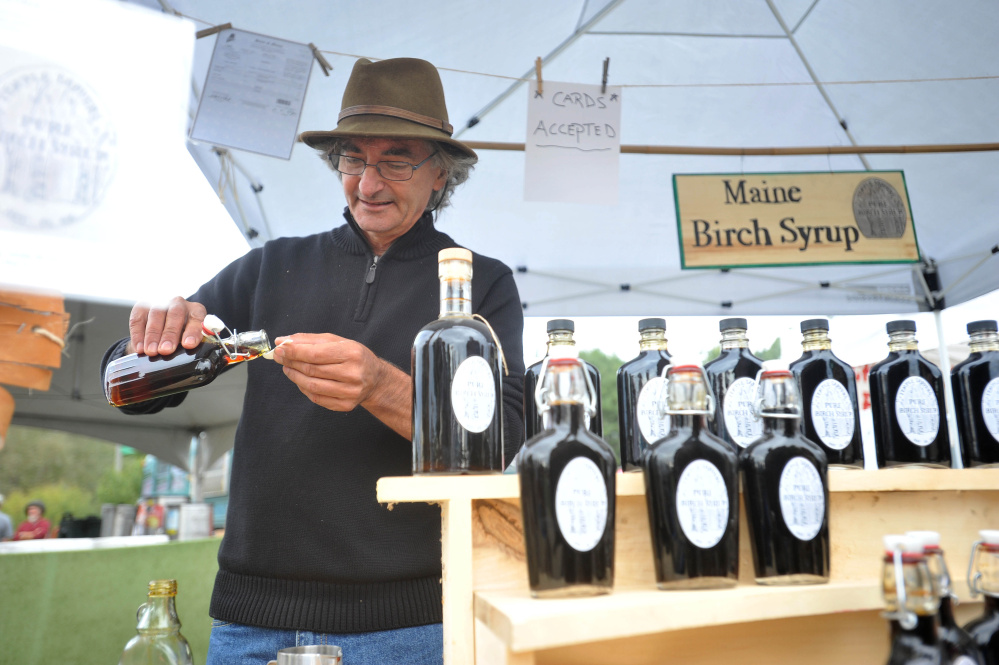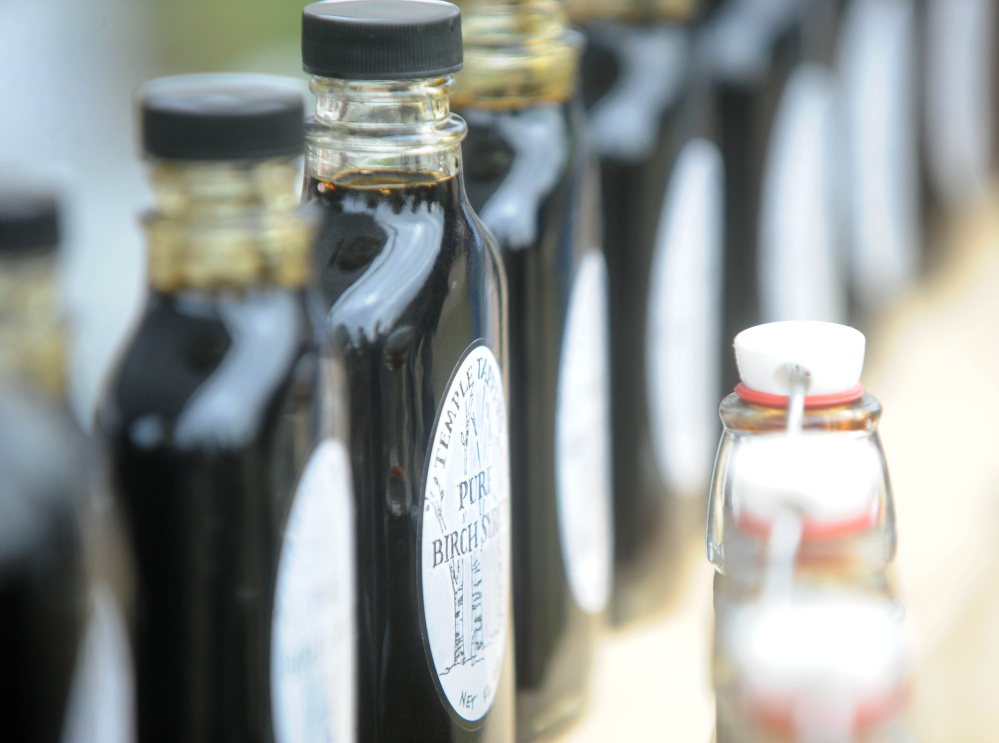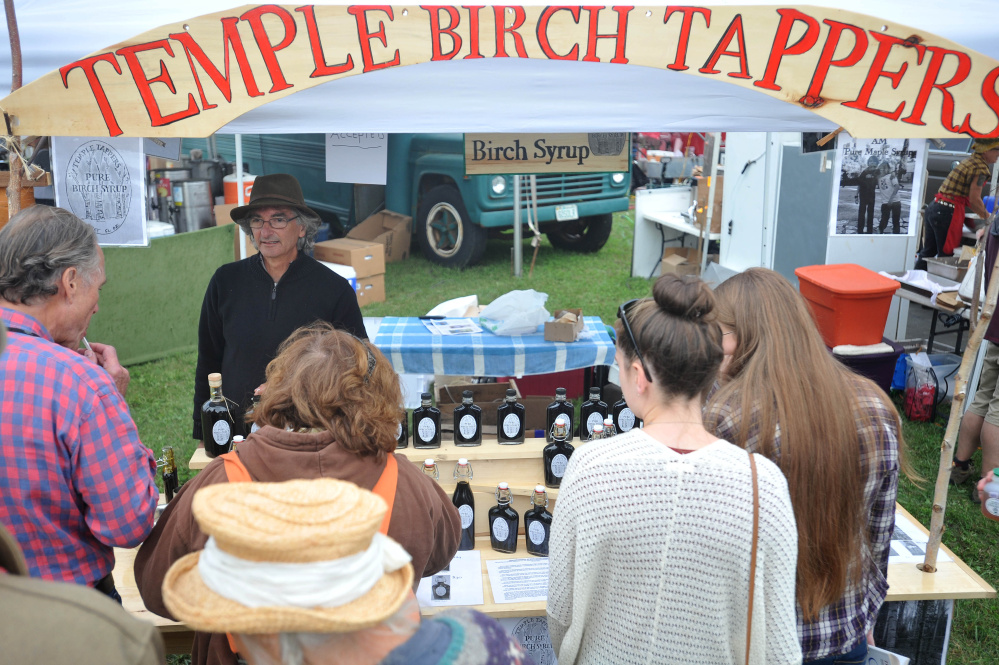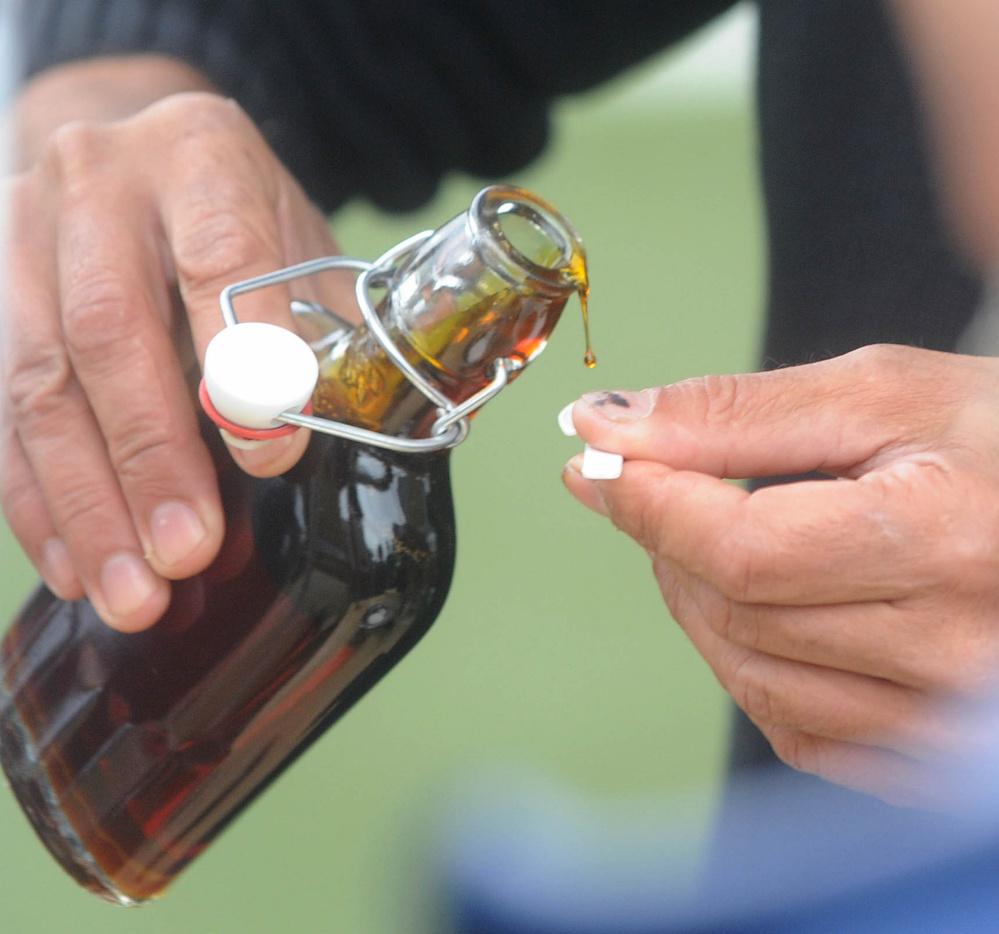At the end of a mile-long dirt road in Temple, the Romanyshyn-Dennison family is tapping into a new market on Maine’s organic-product horizon: birch syrup.
After three years, what started as a simple curiosity into what the family could be producing on their 35 acres of forested land without cutting trees has turned into the first commercially available production of birch syrup in Maine, Mike Romanyshyn said.
“We started three years ago, (but) we started thinking about it four years ago, and then because I knew that people tapped birch in other places, I thought, ‘Oh, we have all this birch; we don’t have very many maples,'” said Romanyshyn. “Even though (the syrup) didn’t come out that good, we sort of got encouraged, and then the next year we tapped about 200 hundred (trees) in the grove.”
According to Romanyshyn, birch trees have been tapped to harvest their sap in parts of Alaska and Canada, and there have been long-standing traditions of birch syrup making in eastern-European countries like Russia, Ukraine and Finland. After reading a University of New Hampshire study on the viability of birch syrup production in the northeastern United States, Romanyshyn was surprised to find that Maine, the state with the highest population of tappable birch trees in the continental U.S., was not producing birch syrup.
Romanyshyn sought to fill this gap and with his wife, Susie Dennison, their sons, Aullie, 11, and Maurice, 9, the Temple Tappers were formed.
Over the last two years the family has tapped more than 800 trees and has upgraded the backyard boiler system they used to produce syrup in their first season to a state-of-the-art sugar house, which Romanyshyn installed himself in an existing barn on the family’s Temple property.
While maple syrup has dominated the syrup market in Maine, Romanyshyn says he has enjoyed the process of producing birch syrup because it’s unique, both in production and in the final product.
Since the Temple Tappers began, Romanyshyn has done extensive research on how to perfect their syrup production, as well as what differs between maple and birch syrup production.
“I know much better how the process works, and what is different about the process from maple,” Romanyshyn said.
To produce maple syrup, it takes 40 gallons of sap to produce one gallon of syrup, according to Romanyshyn, whereas birch syrup requires 100 gallons of sap for one gallon of syrup.
Last year the family put out 800 taps, and on a really good day, Romanyshyn says, one tap can produce a gallon of sap. “But you don’t always get that much,” Romanyshyn said.
This past birch season was cut short, remaining productive for only about two weeks in early April as opposed to the typical three, Romanyshyn said, but the family was still able to produce enough syrup to keep their operation going.
Once the sap is harvested and piped into the sugar house, the sticky syrup business gets started. First the syrup goes through a filter to remove any imperfections from the sap and is then piped into a reverse-osmosis system which begins to extract the water content from the raw sap. The final — and what Romanyshyn says is the trickiest — step in production is the syrup being heated in a wood-fired evaporator.
“You can’t fire (birch syrup) up as hot as you would maple,” Romanyshyn said. “It’s more delicate in the end.”
For this last step, the Temple Tappers choose to evaporate the water out of the syrup in small batches as opposed to heating up all of the syrup at once.
The finished product, Denninson says, has an earthier taste than maple syrup and is best used for delicate food items such as dressings, marinades and glazes.
Birch syrup can cost up to $500 per gallon, but the Temple Tappers sell their finished product in varying-ounce containers.
For the first time since they began tapping for birch syrup, the Temple Tappers were selling their birch syrup at the Common Ground Fair this weekend. Over the weekend, attendees of one of Maine’s largest organic food and agricultural showcases were able to add birch syrup to their shopping baskets for $3.50 an ounce in four-ounce, six-ounce and eight-ounce bottles.
Last spring the Temple Tappers took home first prize in taste for a first-run birch syrup at the International Birch Syrup and Sap Conference sponsored by Cornell University Extension Service at Paul Smith’s College in New York.
Initially, Romanyshyn believed the Temple Tappers would have to market their product to high end restaurants in New York and Boston, but with opportunities like the Common Ground Fair, he has realized that there could be a demand for birch syrup locally if the Tappers simply got the word out that they are making the specialty syrup.
“(We’re) letting people know about it,” Romanyshyn said. “It could have a Maine brand to it.”
Lauren Abbate — 861-9252
Twitter: @Lauren_M_Abbate
Copy the Story LinkSend questions/comments to the editors.






Success. Please wait for the page to reload. If the page does not reload within 5 seconds, please refresh the page.
Enter your email and password to access comments.
Hi, to comment on stories you must . This profile is in addition to your subscription and website login.
Already have a commenting profile? .
Invalid username/password.
Please check your email to confirm and complete your registration.
Only subscribers are eligible to post comments. Please subscribe or login first for digital access. Here’s why.
Use the form below to reset your password. When you've submitted your account email, we will send an email with a reset code.